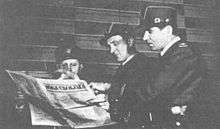Ivan Rohach

Ivan Rohach (Ukrainian: Іван Андрійович Рогач) (29 May 1913 – 21 February 1942) was a Ukrainian journalist, poet, writer, and political activist born in Velykyi Bereznyi (Hungarian: Nagyberezna), Ung county, Austria-Hungary (modern-day Ukraine).
From 1933 to 1938, he was the editor of the Novoyi Svobody newspaper in Uzhhorod, in Carpathian Ruthenia, then part of Czechoslovakia and today in western Ukraine. Between 1938 and 1939, he was the personal secretary to rev. Avhustyn Voloshyn, the nominal Prime-Minister of Carpatho-Ukraine during its several days of independence in March 1939 before it was occupied by Hungary by First Vienna Award. Rohach was an active supporter and member of the Ukrainian scouting movement, Plast.[1]
Political career
Rohach was a prolific writer of political pamphlets and short stories dealing with various aspects of religion, human morality, the nationality question, and the cause for Ukrainian self-determination. He was a member of the Organization of Ukrainian Nationalists (OUN) and an avid supporter of the Andriy Melnyk faction. He moved to Kiev during the German occupation in order to aid in the re-establishment of a Ukrainian administration in the nation's capital. In January 1942, Rohach became the co-editor of the Nove Ukrainkse Slovo ('New Ukrainian Word')[2] newspaper and the magazine "Lytavry" (Tympani), which united those active in Ukrainian culture and arts in the Ukrainian capital.
Arrest and execution
In 1941, Rohach was arrested by the Gestapo for publicly voicing and publishing a negative opinion regarding the treatment of Jews and psychiatric patients by the Nazis . He was taken to Babi Yar where, along with his sister, Anna (Hanna), and his entire staff, Rohach was executed.[2]
Legacy
Poems from his collection of poetry "Brosti" have been set to music. A number of the songs have been included in the Plast song book "U mandry" (To wander) and continue to be sung by Ukrainian scouts today.[3]
In 1992, a wooden cross was placed in his memory on the corner of Melnykov street in Kiev.
References
- ↑ (Ukrainian) Сьогодні у Києві вшанують пам’ять пластунів, розстріляних у Бабиному Яру (Today we honour the scouts who died in Babyn Yar
- 1 2 Dougan, Andy (2004). Dynamo: Triumph and Tragedy in Nazi-Occupied Kiev. Globe Pequot Press. p. 117. ISBN 1-59228-467-1. Retrieved 2008-03-02.
- ↑ Пластуни вшанували своїх побратимів, що загинули в Бабинім Яру :: Новини
- Entsykolpedia Ukrainoznavstva Vol 7 p. 2547
- Þë³ÿí Õèìèíåöü. Ìî¿ ñïîñòåðåæåííÿ ³ç Çàêàðïàòòÿ. - (2) Ïî䳿 íà Çàêàðïàòò³ äî 30 âåðåñíÿ 1938 ðîêó. at exlibris.org.ua
- Ùîäåííèê ×àñòèíà 5. Âàñèëü ¥ðåíäæà-Äîíñüêèé. Ùàñòÿ ³ ãîðå Êàðïàòñüêî¿ Óêðà¿íè at litopys.org.ua
- Îôèöèàëüíûé âåá-ïîðòàë Êèåâñüêîé ãîðîäñêîé âëàñòè - Êèåâ â Îòå÷åñòâåííîé âîéíå 1941-1945 ãã. at www.kmv.gov.ua